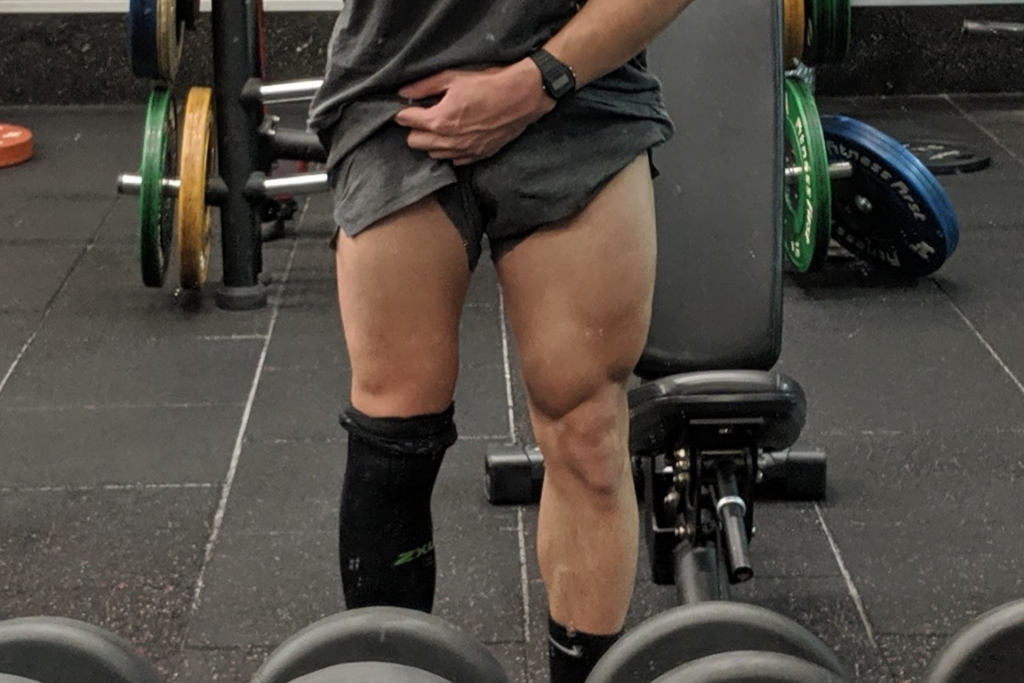Knee Surgery and The Road To Recovery
This is a story about pain, uncertainty and how to see through the fog to reach your goals on the slow road to recovery from knee surgery.
Last year I suffered a devastating knee injury: I tore my patellar tendon. I went in for surgery the next day, and was stuck in a brace for 6 weeks. Surprisingly, post surgery was physically tolerable for me but mentally it was pretty tough.

Post surgery the first week was a struggle. It felt like a massive burden as I needed help with getting dressed, showering, and just getting around (I couldn’t drive for 6 weeks). I couldn’t walk the dogs. I went from working six days a week, training at the gym 5 times a week, and playing volleyball twice a week to absolute nothing as I had to recover from this knee surgery. At this point, it felt like I was never going to get back to my regular activities.
Mentally, I did not know how to deal with all this time off. Initially I spent a lot of time in bed just napping and trying to fight through brain fog. I started catastrophizing and thinking the worst for this injury. Eventually I got tired of moping around, decided to spend some time planning out what I wanted to get out of this. I made a list of the things I wanted to do that I couldn’t when I was busy with work. I needed a routine. I needed to normalise life again.
I started meditating, I cooked, I read books, and I dusted off the Xbox One and started playing video games again.
After the first week, I was cleared to go to the gym to start training upper body, while doing rehab for my lower body. I had to come up with ways to modify all the exercise to eliminate the use of my right leg.

Over the next few weeks, I was slowly able to piece together my routine (especially as I became able to do more things). I still had days where I just wanted to stay in bed and do nothing because I felt mentally defeated.
I am now about 1-year post knee injury, and I am back to doing everything that I love and living life without restrictions. My powerlifting lifts are stronger than they were pre-injury. I’ve been playing some volleyball, going for hikes and running.

Here are some tips that personally helped me get through the injury:
1. Understand that Resting After Injury is Not Time Wasted
In this current day and age, it almost felt like everyone was competing on who can be more productive. I felt guilty that I wasn’t being productive just sitting at home when the rest of the world is out there doing stuff. It took me a while to understand that resting and just chilling after an injury is not time wasted, because at that time, getting proper rest was key to the recovery of my knee. The sooner that I accepted that mindset, the sooner I was able to enjoy activities such as playing video games, reading books and just chilling with the dogs.
2. Find Support
Speaking to others who went through a similar situation and finding someone to talk to about the injury helped enormously with my anxiety. Working with a physiotherapist helped me get an unbiased second opinion and advice on my recovery.
3. Keep an Open Mind and Be Flexible About Your Recovery
The recovery process is not always going to go as planned. I had to understand that I couldn’t compare my recovery with someone else’s. I overdid the amount of walking, and did a workout (when I shouldn’t have) the second day post-op resulting in a split wound and uncontrollable bleeding. I had swelling up until week 10 of my recovery and was struggling to get full extension during that time. My right knee still sits higher than normal. There will be setbacks, and that’s normal as a part of the recovery process.
4. Develop Structure and Routine in Your Day
I found that on days where I had nothing planned, I would spend more time in bed stuck with my thoughts. As soon as I started allocating specific time for specific tasks, it motivated me to get out of bed and get my day started.
5. Set Clear Goals
My planned goals for recovery was to return to work in 1 month, return to doing squats and deadlifts by 6 months and return to volleyball within a year. In order to achieve those goals, I set clear, smaller milestones that I had to hit. Examples of my goals were: Walk 2km with brace and crutches in 3 weeks, full knee extension and full knee flexion in 12 weeks, full depth squat in 4 months, 90% triple hop test by 10 months. By tackling these smaller goals, I felt a sense of accomplishment because I was one step closer to reaching my larger goals.
6. Be Consistent with Your Plan
It may be difficult to stay motivated to do an exercise plan for recovery because the difference is unnoticeable day to day. I knew that if I stuck with a plan, then month to month I’ll be able to see the changes and achieve my goals. Trust the process.
Our team at Lift is dedicated to help support your recovery. We’re here to help you develop a plan so that you can return to doing what you love doing after an injury.
